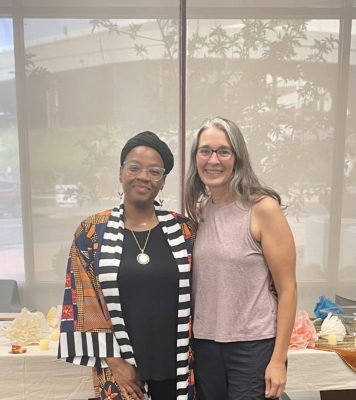First PMD training for BIPOC providers

More than 55% of births in Arizona identify as a person of color (Lewandowski et al., 2020); however, the number of BIPOC birth workers trained in perinatal mental health does not reflect these numbers.
Along with Lakisa Muhammad, CPM, along with Arizona Birthworkers of Color and Elizabeth Wood, PSI-AZ Chairperson, set out to increase the number of BIPOC birth workers trained in perinatal mental health by leading a 2-day Perinatal Mood Disorders : Components of Care and Advanced Psychotherapy training in their state.
After countless hours of planning, recruiting volunteers, and securing sponsorships, the FIRST BIPOC training for providers of color facilitated by providers of color took place May 19-21, 2023. At the end of the weekend, PSI trainers Karla Cardoza, LMFT, Kristy Christopher-Holloway, EdD, LPC, PMH-C, and Saira S. Kalia, MD, MBBS equipped 98 AZ birth workers with additional skills to support the perinatal mental health of AZ families.
“This course is amazing. If you work with families, this course is for you. You never know when you will meet someone dealing with perinatal mood disorder[s] or just struggling during this time,” shares Natassia Williamson, FNP-C, CHC.

Nellie Del Toro, a Birth and Postpartum Doula, highlighted, “I learned a lot this past week. It was amazing to be surrounded by so many BIPOC birth workers, therapists, nurses, healers, students, parents, and others. We show up for our community! Thank you, PSI-AZ and Arizona Birthworkers of Color.”
 In addition to being the first PSI chapter to offer BIPOC-only training, PSI-AZ awarded 86 scholarships with the help of the Arizona Department of Health Services, and The Alliance created ten scholarships.
In addition to being the first PSI chapter to offer BIPOC-only training, PSI-AZ awarded 86 scholarships with the help of the Arizona Department of Health Services, and The Alliance created ten scholarships.
“The BIPOC-only perinatal mental health trainings provided by Postpartum Support International will directly address disparities in the diagnosis and treatment of perinatal mood and anxiety disorders and the need to diversify the perinatal mental health workforce. We must understand that to go beyond the surface level of this important information; participants should feel safe with each other and the facilitators. The ability to show up as their true selves will allow learning to reflect on a deeper level. We need these cultural ambassadors to take the information and deliver it in a way that they know their community will understand and accept. From here, we will be able to positively impact severe perinatal mental health conditions for families, parents, and their children,” shared Lakisa Muhammad.
The steps taken by PSI-AZ and the Arizona Birthworkers of Color to increase the number of BIPOC providers trained in perinatal mental health in their state are inspiring. Their hard work, steadfast devotion, and compassion for their community has made it possible for Arizona to make tremendous strides in increasing the number of BIPOC trained health care providers by demonstrating that representation is really important.

Watch the BIPOC training on AZ 12 News here.
Connect to PSI-AZ:
Website: psiarizona.org
Connect with Arizona Birthworkers of Color:
Website: arizonabirthworkersofcolor.com
If you want more stories centered around BIPOC providers and events, subscribe to The Alliance newsletter today.
Sources
Lewandowski KS, Baer CE, Schoustra R, Indatwa A, Celaya MF, Tarango P. SB 1040 Annual Report on Maternal Fatalities and Morbidities in Arizona. Phoenix, AZ: Arizona Department of Health Services; 2020.





